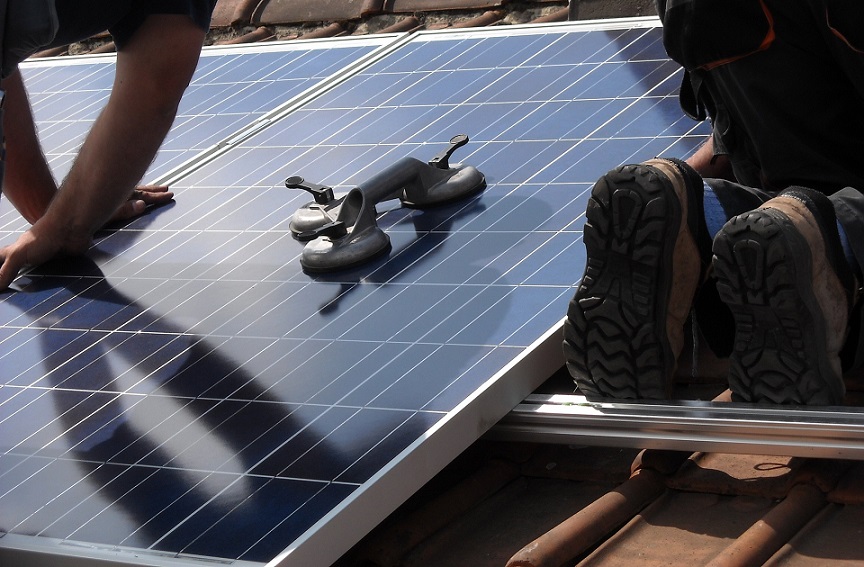When a union tried to improve living conditions in a shantytown in southern Spain by installing solar panels, the local government took legal action.

Jasmine Owens
The Spanish government is failing to provide adequate living conditions for the thousands of workers who migrate to Spain to work in the agricultural sector.
Not only is the government failing to meaningfully address the dire living conditions of thousands of workers who end up living in makeshift shantytowns, but it also actively makes life harder for people living there.
This can be demonstrated through the example of solar panels set up in shantytowns in Huelva, which the local government confiscated.
How do solar panels benefit migrant workers in southern Spain?
In Huelva, thousands of workers and their families live in settlements, in housing made out of wooden pallets, cardboard and plastic from the local greenhouses.
Solar panels are particularly beneficial to settlement residents because they prevent the need to use candles for light in the evenings. As shacks are makeshift and regularly built from flammable materials candle use is incredibly hazardous. Fires are common and have devastating impacts. In February 2021, a fire left 500 agricultural workers homeless.
Crowdfunded solar panels
During coronavirus migrant workers living in the settlements, who provide fruits and vegetables for UK supermarkets, were confined to the cramped settlements where they live by the social-distancing laws.

Many workers were left unable to work during the pandemic (due to restrictions on travel), meaning that they had no income and were in urgent need of supplies. Many lacked access to running water, basic sanitation or food.
In July 2020, Ethical Consumer ran a crowdfunding campaign to provide emergency support during the first pandemic lockdown. We had been campaigning for over two years to highlight the exploitative working conditions in the region, which supplies many of the fresh vegetables in UK supermarkets.
Ethical Consumer readers met the initial Crowdfunder target of £6000 for urgent supplies in just 4 hours.
A total of £26,000 was raised overall – providing the union with the resources needed to make purchasing solar panels possible, alongside other vital supplies like food and PPE.
Union leaders threatened with legal action over the panels
The situation for migrant labourers working in southern Spain is graphically illustrated by what happened to solar panels installed with crowdfunded money during the pandemic. In December 2020, a representative of the SAT Union in Huelva was threatened with legal charges by the Spanish police, seemingly over the installation of the panels.
José Antonio Brazo says that the Civil Guard, the Spanish police, told him at the end of December that he was being investigated in relation to crimes related to “land planning.” The penalty for this crime could be up to four years in prison. The company responsible for the installation of the 6 solar panels was also informed that they were being investigated for the same crime.
The Civil Guard said that the Lucena del Puerto City Council was behind the accusation.
José told us, “Some of the money from the Ethical Consumer crowdfunder was used to buy photovoltaic solar energy equipment, which provides light, mobile phone charging, and powers a communal freezer in the shantytowns. The four solar panels have improved the lives of migrants – even if they’re not yet living the dignified life they deserve.”

“The only crime that’s been committed is helping install solar panels in an immigrant shantytown. Solidarity isn’t a crime.”
The government confiscated the panels
On 11 June 2021 local police entered the settlement in Lucena del Puerto where the six solar panels were installed, and removed them.
The government claimed the panels were a fire risk and illegal permanent installation in a public area.
Workers demonstrated outside the town hall calling for the panels’ return, and Ethical Consumer launched a petition calling for the return of the panels, which was signed by over 24,000 people. But the panels were never returned.
El Pais also wrote about the confiscation of the panels, drawing national attention to the actions of the local Huelva government.
*This article was first published on the Ethical Consumer website. The Prisma is collaborating with Ethical Consumer to translate a series of articles, which focus on workers’ rights issues in the agricultural sector in southern Spain.
(Photos: Ethical Consumer)












.jpg)












